Last week, I wrote about my dad’s final days. Today’s post is on a happier topic, my dad’s life. I will be taking next week off and will be back on June 19 with a regular post.
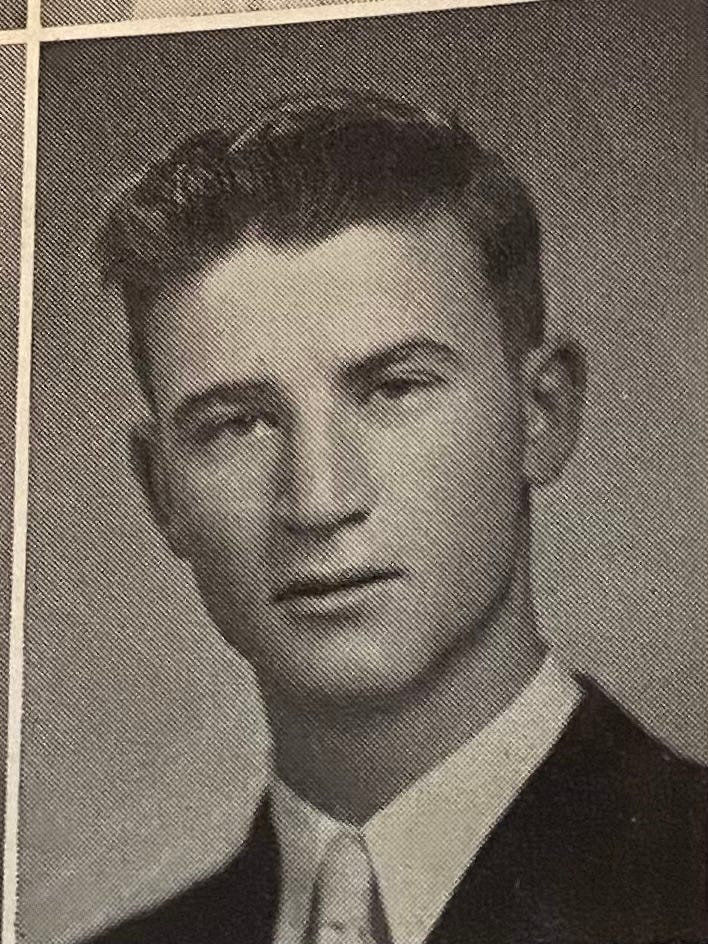

Eulogy Virtues
Our culture’s concept of heroism can be sadly limited. We tend to think of heroes as people who perform dramatic acts, who display extraordinary virtuosity, and who take outsized risks to save others—for example Captain Sullenberger. And Sully deserves our accolades! But this form of heroism is inaccessible to most of us. We lack the courage to sacrifice our lives (or I do, at least), and very few of us will ever face a situation so dire that heroism is called for—thankfully! But we all are capable of my dad’s kind of heroism. We can all make choices as part of ordinary life that will improve the world for other people. These “eulogy virtues” won’t make us famous, and still less will they make us millions. But they make us something much more important: Beloved.
Dad was born at the height of the Great Depression to a loving, working-class family. He was the cherished little brother of four big sisters, and he also had two adopted brothers, one much older, and one much younger. As a boy, he cared for a veritable menagerie of pigeons and dogs. He got up to the usual kid mischief, as well as the less-usual—like when he was six and disassembled the lawnmower to see how it worked and then couldn’t put it back together. As a teenager and young adult he was an athlete and adventurer. He water-skied down the Mississippi River—in Minnesota, in February. He was one of the top high school football players in the state, and he was recruited to play shortstop for the Twins farm team, but he broke his arm and had to quit the team. To earn cash after high school, he and his friends road-tripped to Alaska to help build the railroad. He then served in the army as a quartermaster at a base in France and traveled all around Europe.
After college, Dad worked in public middle schools as a teacher, counselor, assistant principal, and principal. His high expectations and obvious affection for the kids, plus his goofy sense of humor, meant he was a great favorite. For years, every time our family went anywhere teenagers hung out, he was treated like a celebrity. He was my assistant principal when I was in seventh grade, and he was so popular (and I was so nerdy) that he raised my social status.
My dad and mom met at the middle school where they both taught. They fell in love and got married in 1963. I wrote about their loving sixty-year marriage here.
Dad retired at age sixty and spent the next decades enjoying life and helping others. He volunteered at church, where he was an ace party-planner and quiz-master. He loved spending time with our family Up North to the Lake every summer. He taught his grandkids how to fish and gladly took on the chore of cleaning all the sunnies we caught:
He taught his granddaughters how to pick chokecherries and spit out the seeds—and then held a seed-spitting contest (and did NOT let his granddaughters win!):
Among his many home-improvement projects, Dad single-handedly converted a fifteen-hundred-square-foot unfinished walkout basement into a guest apartment. Just after Dad turned 91, my mom made the mistake of telling him she planned to hire someone to renovate the back deck, so he promptly went out and did it himself.
Around the neighborhood, Dad was famous for his ice cream parties to celebrate the last day of school—a tradition he and my mom started sixteen years ago—for his dog treat stand, for his stash of chocolates for the neighbor kids, for his elaborate Halloween displays and extensive Santa Claus collection, for his propensity to wear silly wigs and hats to amuse passers-by, and for his helping hand for anyone who needed it.
Be a Maker
We all can follow Dad’s example and practice the everyday heroism of making life better for others.
Dad made things: For example a Swiss-chalet-style dollhouse for me and a go-cart for my brother, bread and soup for friends, wine from fruit he grew himself—apples (tasty!) and grapes (sour!1)—and the largest hosta garden in the known world.2
He made conversation: I discovered Dad’s conversational chops was when I was eleven. My mom, then a high school ESL teacher, invited three of her students for dinner. Dad kept the conversation going with these shy, teenage English-learners for over an hour while my mom cooked.
He made us smile: Whether his audience was cashiers, the UPS guy, or even the nurses in the hospital the day before he died, Dad was always ready with a joke.
He made a difference: Most of his time as a principal was spent in low-income schools. He held his students to the same academic and behavioral standards as we normally expect only of privileged kids, and his students blossomed. As just one example, Dad didn’t allow students to swear at school—and so they didn’t. Turns out that all kids, no matter their skin color or family income, prefer a calm, respectful learning environment and are fully capable of adhering to the rules if we just ask them to. For many years my parents also volunteered as teachers in poorer countries around the world.
Finally, as Dad’s grandson Harrison said at the funeral, “He was someone who made his community a better place.” His grandson Noah told the mourners about a time a homeless man asked him for spare change. Noah didn’t have any cash on him, but he thought, “What would grandpa do?” and went into a CVS to buy the man a gift card. He thanked Dad for teaching him that we should “treat everyone with honor and kindness. I’m so lucky to have had such a fantastic example of living by those principles to look to while growing up.” His granddaughter Casey added that “My grandpa inspires me to be a member of my community, too, and to look for the unique friendships to be found with everyone we meet.” Such (literal) eulogy virtues are our most meaningful legacy of all.
A Few More Stories, Just for Fun
On any flight, moms could count on Dad to hold their babies so they could take their toddlers to the bathroom, and every passenger appreciated Dad’s magic touch with crying babies.
He made a point of learning the names of the hundreds of students in his schools. I adopted this practice when I was a teacher, and, on the first day of school, would recite the names of each student at the end of each class. One day my parents visited me and sat in on my classes, and Dad ended each class by reciting the students’ names, to their delight.
One night when we were in a sketchy Chicago neighborhood, a belligerent, drunken man confronted Dad: “Do you think I’m a [n-word]?!” Dad didn’t miss a beat. He responded, “I think you’re a brother,” and shook the man’s hand.
A child of the Depression, Dad loved to spar with salespeople. He once argued with a pushy car salesman for more than two hours. The salesman stormed out a few times but ultimately agreed to the price Dad had offered in the first place. On the other hand, on my parents’ service trips to poorer countries, Dad liked to bargain with market vendors, but once he had gotten them down to a super-low price, he would pay them the full price they had initially requested.
Dad was organized and tidy in the extreme. Truly you can’t even imagine. To this day, whenever anyone in our family can’t find something, my brother will joke, “It’s in Mari’s closet,” because that’s where Dad used to deposit stray items, just to get them out of sight. Similarly, because having a toaster on the countertop is “messy,” my parents’ toaster inhabits a cupboard. Which means that when guests are staying in the house, the toaster is hauled out and stowed away at least a dozen times a day. Never mind. We have all decided to honor Dad by keeping the toaster in the cupboard. Every time I retrieve it, sometimes for the umpteenth time that day, I think, “This is for you, Dad.”
For many years he was a single-digit-handicap golfer, and for his last decade he golfed below his age (he joked that that was only possible because he was old). When I was in seventh grade, he bought me a set of clubs and tried to teach me the game. But he realized early on that I wasn’t enjoying myself. Instead of reproaching me or even showing any disappointment, he just sold the clubs and never brought the subject up again.3
A self-styled “worker guy,”4 Dad was a master fixer-upper. Throughout my childhood he kept everything in and out of our house—cars, the washer and dryer, the dishwasher, and, on one regrettable occasion, a blowdryer that had been shooting out flames—chugging along.

And finally, no profile of Dad would be complete without mentioning his great love for dogs. Dad had dog mojo: I have seen him convert an angry guard dog into an affectionate pupper, calm an anxious dog who was terrified of all men but him, and teach his dogs clever tricks. (He taught his boxer to pretend to smoke a pipe, and he taught our family’s basset hound to balance a treat on his nose and wait until Dad said OK before he flipped it into the air and gobbled it up.) For more than two decades, Dad enjoyed spending his mornings at the front window with his coffee and the paper, watching as the neighborhood dogs walked by. “Dog alert! Dog alert!” he would call, and we would come running.
How about you, readers? Who is your everyday hero? Please share your thoughts in the comments.
The Tidbit
Last week I shared videos of two of Dad’s favorite songs. Below is another. Our whole family used to sing this song together on car trips, with Dad on the bass line. Sing along with us!
There is a reason that Minnesota is not a top wine-producing region.
I would estimate that the garden holds some five hundred hostas, most of them acquired for free, and all of them planted by Dad.
It’s ok though. A couple of years ago Dad bought clubs for his granddaughter Arianna, who loves golfing. They golfed together every week and, as Arianna said at the funeral, “Those days at the range are some of my favorite memories with my Grandpa. He didn’t only teach me lessons about golf, but also about life, patience, and how valuable time with your loved ones is.”
When Noah was little, we made matching “worker guy” t-shirts for Noah and Dad. They used to wear the t-shirts when Dad tackled household projects and Noah “helped” him.




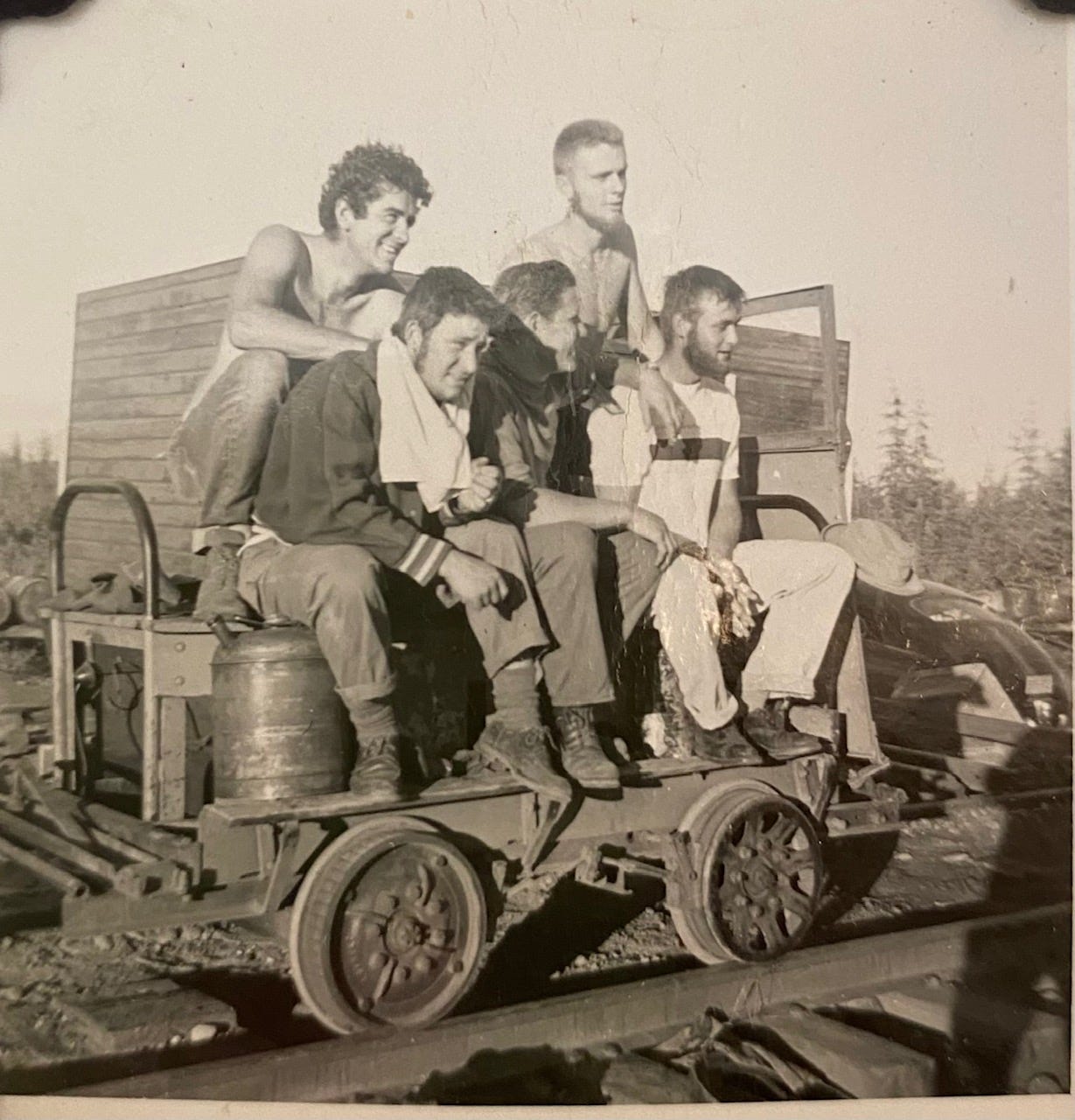
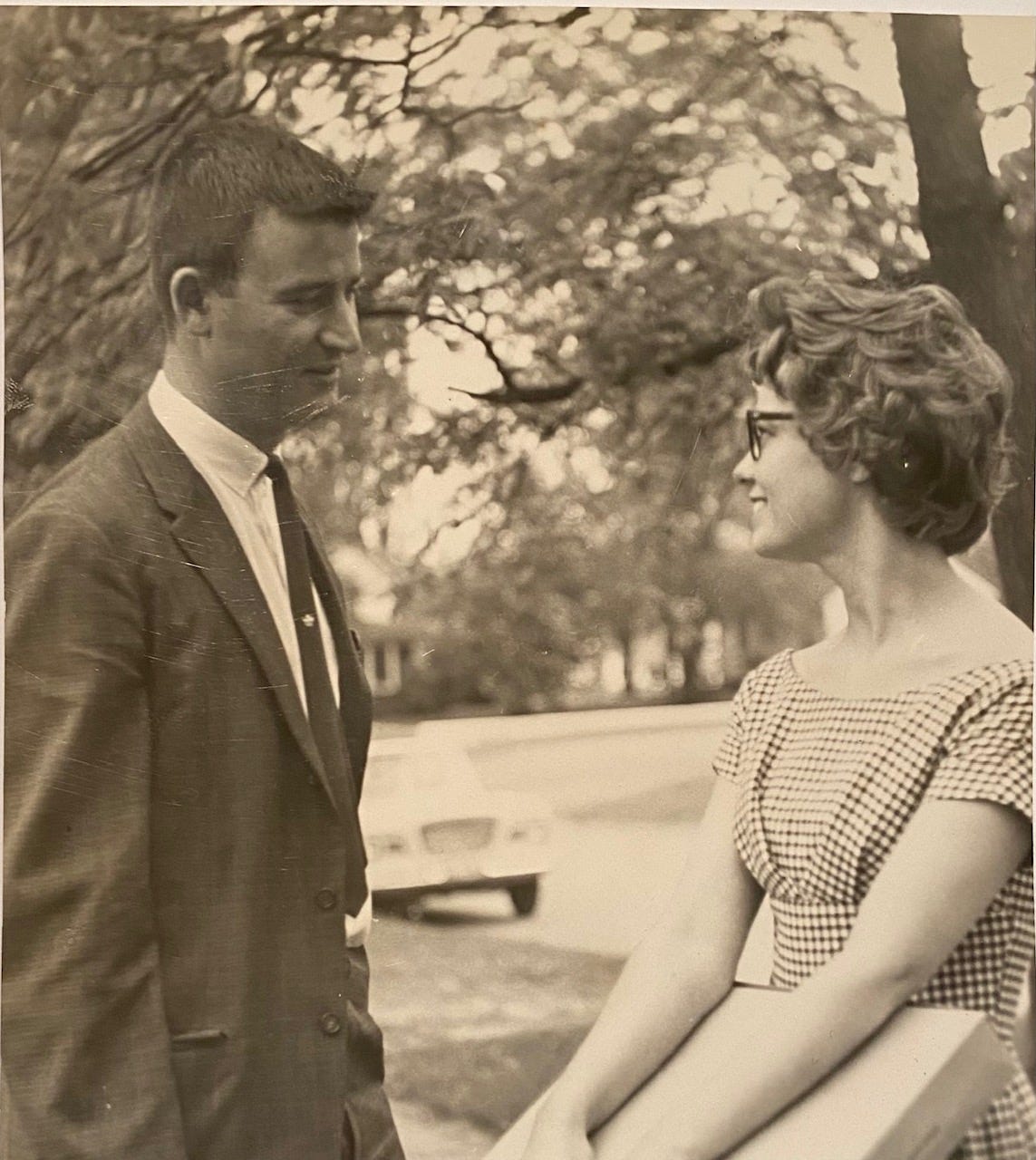

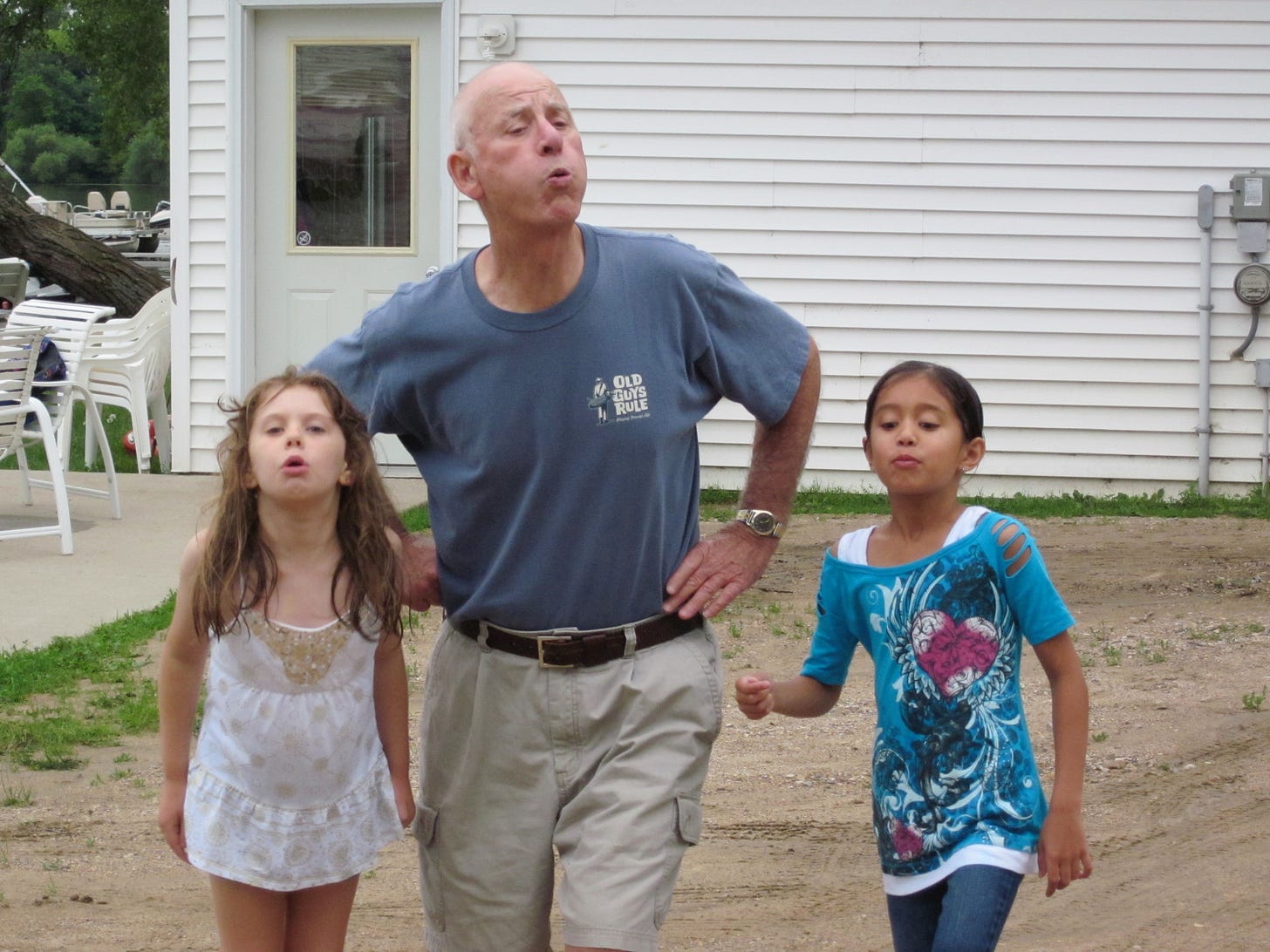

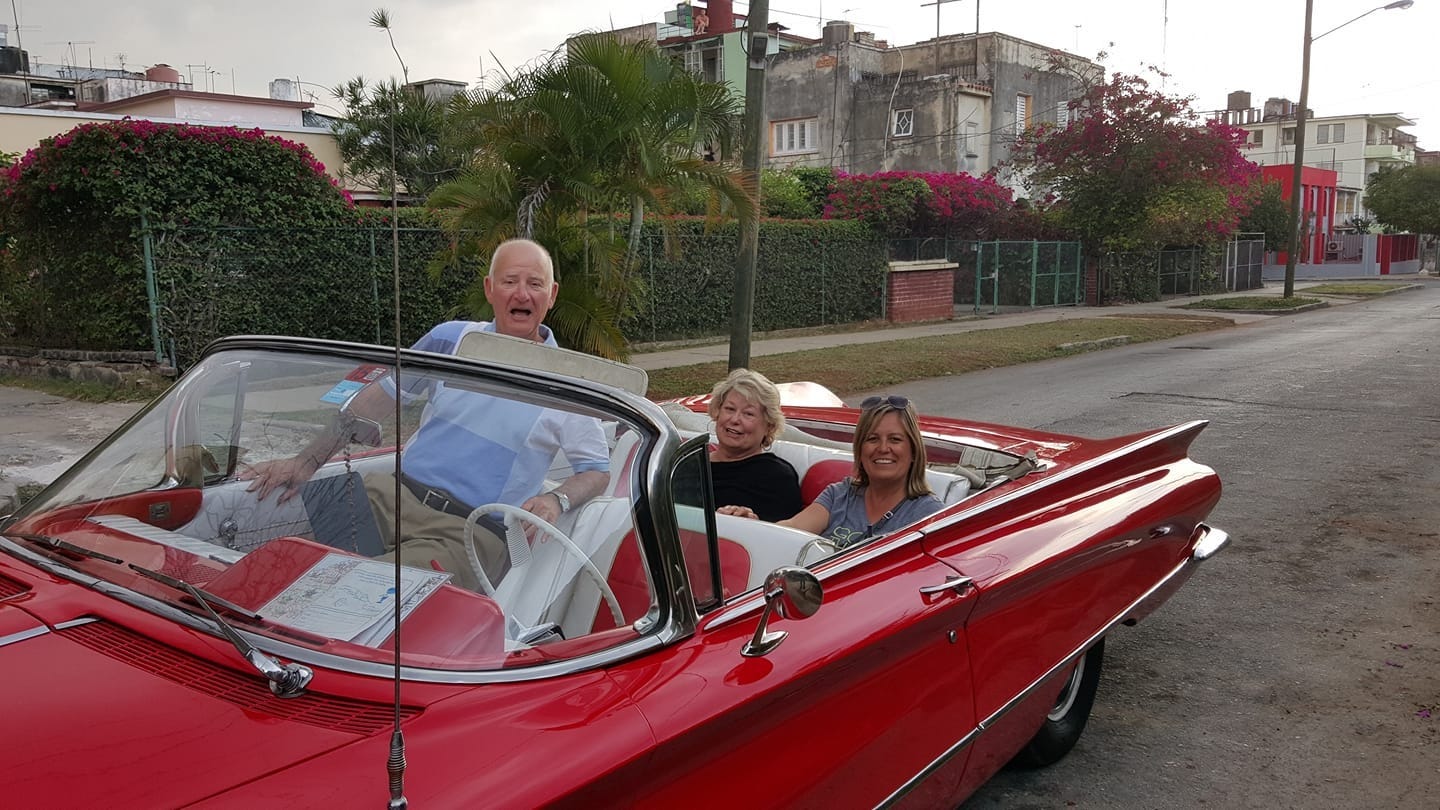
A lovely tribute, Mari! Treasure your memories!
Mari,
This piece really moved me. Your dad sounds like a wonderfully kind person who I'm sure was well loved in his community. My condolences on his passing.
On the topic of him being a "Worker Guy", I recall a story you told about him at your high school graduation party. The story: Your dad determined there was a walled off room in the basement of your house (à la the 'Red Room' in The Amityville Horror). He broke through the cinderblock wall and sure enough, there was a small room behind it. You showed us the room, and it was the most amazing thing! So clever of him to have figured out the room was there, and so brave (I'm speaking as a homeowner) to trust his reasoning enough to break through the wall. Obviously, I found it a memorable story - I've been carrying it around for a power of years. It certainly fits with your dad's character, as you've sketched it for us.
One of my everyday heroes was, and still is, my dad. While he performed some extraordinarily heroic acts, like breaking up an armed robbery and getting shot for his trouble (he wrote the robber's license number in the snow - great presence of mind for a guy who was on his butt and bleeding heavily), it was for his everyday acts of kindness and tireless desire to help that I remember him best.
Today is Father's Day. In that spirit, let's raise a virtual glass for our heroes: our dads.
Remembering that, "It is no bad thing to celebrate a simple life."
Blessings to you and your family,
'Gent'
P.S. Mari is frood who really knows where her towel is.